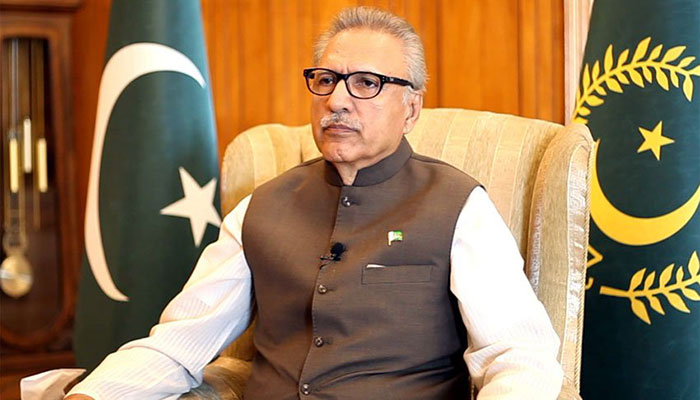Govt seeks Supreme Court’s opinion on Senate voting through open ballot

ISLAMABAD: The federal on Wednesday sought the opinion of the Supreme Court of Pakistan on holding the upcoming elections for the Upper House of Parliament through open ballot and show of hands.
Filed under Article 186 of the Constitution by the Attorney General of Pakistan Khalid Javed Khan after getting approved by President Dr Arif Alvi, the govt sought the opinion of the country’s highest court on amending Section 122(6) of the Elections Act, 2017 without amending the Constitution.
“The requirement of vote for elections for Senate isn't by way of a constitutional mandate but it's by only way of a statutory provisions namely Section 122(6) of the Elections Act, 2017, which can be amended by an act of Parliament or through an ordinance promulgated under Article 89 of the Constitution,” says the reference.
The reference contended that the hands of the legislature can't be tied by way of implication or assumption of a constitutional prohibition where none exists specifically.
“This is all the more so when the matter doesn't impinge upon fundamental or vested right of the citizens,” says the reference, adding that secrecy or openness of ballot is merely relatable to the machinery provisions of a statute. It further submitted that the legislature in its wisdom may equally provide for open ballot for elections to the Senate by substituting the word ‘secret’ with ‘open’ in Section 122(6) of the Elections Act, 2017.
The president submitted that the interpretation of the Constitution and therefore the laws is that the exclusive domain of the judiciary with the Supreme Court because the final court.
“Through the reference, the opinion of this august court is requested on the legal question on whether the elections for the members of Senate don't fall within the elections held under the Constitution as envisaged in Article 226 of the Constitution with the consequence that voting might be held either through open orsecret ballot as could also be provided within the Elections Act, 2017 itself,” says the reference.
The reference contended that the moment question of law of public importance has arisen within the context of the malaise of vote buying that has damaged the purity of elections. “Every Senate election since 1985 has generated debate followed by commitment for reform and promise for open ballot,” it added.
The reference further contended that there's a national consensus amongst all major political parties, jurists, academia, journalists and civil society that the electoral process should be cleansed of the pervasive practice of vote buying in elections to the Senate. “Even if Article 226 of the Constitution was amenable to 2 possible interpretations, this court has always adopted the interpretation which advances greater public welfare and good,” says the reference.
It contended that through acceptance of the interpretation of Article 226 as advanced here, the larger national objectives might be achieved through equally legitimate constitutional methodology of interpretation of the Constitution entrusted to the court.
The reference claimed that it'll promote transparency and accountability within the electoral process, acknowledge respect for the selection and desires of the citizen voters, strengthen political parties and their discipline which is important for democracy , discourage floor crossing, use of laundered money for vote buying in elections which grossly insults the mandate of the people.
The reference recalled that the difficulty of open ballot/show of hands as against vote also arose within the context of elections under the government constituted under Article 140A of the Constitution.
It submitted that a division bench of Balochistan supreme court delivered a judgment within the case of Attaullah vs Government of Pakistan PLD 2014 Balochistan 206 holding that the elections to government are covered under Article 226 of the Constitution and, therefore, must be held by vote .
“This view was also adopted by a division bench of Sindh supreme court within the case of MQM vs Province of Sindh PLD 2017 Sindh 169. The judgment of SHC was appealed against within the Supreme Court in Civil Appeals No.760 to 765 of 2016 within the case of the Province of Sindh vs Muttahida Qaumi Movement. Vide order dated 15.4.2016, a 3 member bench of the Supreme Court was pleased to carry that the elections for the posts of mayor, deputy mayor, chairman and president are to be held under the Constitution and therefore the law i.e. the Sindh government Act, 2013, therefore, it's within the competence of Sindh government to legislate law to carry such elections either through show of hands or vote ,” says the reference. It adds, “This principle of law as enunciated by the Supreme Court within the case of local governments is to use for election for members of the Senate.”
The reference also cited an example of India stating that India Representation of the People Act, 1951, had initially provided for vote for elections to the Upper House, however, later faced with the malaise of vote buying Section 59 of the Act, 1951, was amended within the year 2003, providing for open ballot for elections for members of the Upper House.
The government contended that if the approaching elections to the Senate are once more marred by vote buying due to secrecy of ballot as went on within the past, this is able to undermine the arrogance of the people in democratic process.



0 Comments